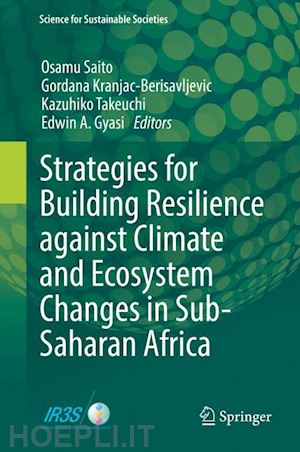
Questo prodotto usufruisce delle SPEDIZIONI GRATIS
selezionando l'opzione Corriere Veloce in fase di ordine.
Pagabile anche con Carta della cultura giovani e del merito, 18App Bonus Cultura e Carta del Docente
This book summarizes studies on climate and ecosystem change adaptation and resilience in Africa (CECAR-Africa), a collaboration with the goal of creating an integrated resilience enhancement strategy as a potential model for semi-arid regions across Sub-Saharan Africa by combining climate change and ecosystem change research. The case studies were conducted at multiple scales – local, national, and regional – and incorporate the natural sciences, social sciences and engineering in a transdisciplinary manner while also integrating the needs of local communities.
The book chiefly addresses three thematic areas, namely: Forecast and assessment of climate change impacts on agro-ecosystems; Risk assessment of extreme weather hazards and development of adaptive resource management methods; and Implementing capacity development programs for local leaders and practitioners. The collaborative nature of the project and the use of various quantitative and qualitative research technique
s and methods – such as field surveys, questionnaires, focus group discussions, land use and cover change analysis, and climate downscaled modeling – make the book truly unique.
Especially at a time when both long-term climate change and short-term extreme weather events such as droughts and floods are worsening, this book offers potential approaches to developing an integrated framework for assessing the local ability to cope with floods and droughts, and for enhancing the resilience of farming communities in developing countries, which are the most vulnerable to these changes and extreme weather events. As such, it will be of interest to a wider audience, including academics, professionals, and government officials alike.
Part I Formulation of ‘Ghana Model’.- Toward Enhancing Resilience to Climate and Ecosystem Changes in Semi-Arid Africa: Evidence from Northern Ghana.- The Ghana Model for Resilience Enhancement in Semiarid Ghana: Conceptualization and Social Implementation.- Part II Case Studies on Climate and Ecosystem Change Impacts on Agriculture and Livelihood.- Response of Maize to Different Nitrogen Application Rates and Tillage Practices Under Two Slope Positions in the Face of Current Climate Variability in the Sudan Savanna of West Africa.- Impact of Floods on Farmers’ Livelihoods in the Semiarid Zone of Benin.- Socioeconomic Impacts of Climate Change on the Livelihood and Adaptation Strategies of Smallholder Farmers in the Upper White Volta Basin of Ghana.- Evaluating the Effect of Irrigation on Paddy Rice Yield by Applying the AquaCrop Model in Northern Ghana.- Farmers’ Livelihoods and Welfare in the Wa West District, Upper West Region of Ghana.- Part III Case Studies on Ecosystem, Bio-production and Socioecological Production Landscapes.- Diversity and Dispersion Patterns of Tree Species Within Household Farmlands and Open Parklands in the Talensi Area of Northern Ghana.- Assessing Land and Ecosystem Management at the Local Level in the Savannah Ecological Zone and the Implications for Sustainability.- Non-timber Forest Products, Climate Change Resilience, and Poverty Alleviation in Northern Ghana.- Material Flow Analysis of Shea Butter Production Systems:Implications for Sustainability in Semi-arid Ghana.- Part IV Case Studies on Climate Change Adaptation and Coping Strategies.- Strategies of Farmers in the Bawku West District of Ghana to Mitigate the Impacts of Climate Variability on Farming.- Green Farming Practices for Climate Change Mitigation and Adaptation: A Comparison of Conventional Practices and Vetiver Technology.- Exploring the Role of Trust in Risk Communication Among Climate-Induced Vulnerable Rural Communities in Wa West District, Ghana.- Examining Farm Management Practices and Implications for Food Crop Production in Semiarid Ghana.- Adaptation to Climate Change: Lessons from Farmer Responses to Environmental Changes in Ghana.- The State of Disaster Risk Reduction Mainstreaming in Pre-tertiary Education in Ghana: An Exploratory Study.- Part V Synthesis.- Internationalization and Localization of the Ghana Model:Lessons Learned, Opportunities for Upscaling, and Future Directions.
Osamu Saito, Ph.D, Academic Director/ Academic Programme Officer, United Nations University Institute for the Advanced Study of Sustainability (UNU-IAS), Tokyo, Japan
Kazuhiko Takeuchi, Ph.D., Director and Project Professor, Integrated Research System for Sustainability Science (IR3S), The University of Tokyo Institutes for Advanced Study (UTIAS), Tokyo, Japan; Chair of the Board of Directors, Institute for Global Environmental Strategies (IGES), Kanagawa, Japan
Edwin A. Gyasi, Ph.D., Professor, Department of Geography, University of Ghana, Legon, Ghana
Gordana Kranjac-Berisavljevic, Ph.D., Professor, Department of Agricultural Mechanisation and Irrigation Technology, University for Development Studies, Tamale, Ghana











Il sito utilizza cookie ed altri strumenti di tracciamento che raccolgono informazioni dal dispositivo dell’utente. Oltre ai cookie tecnici ed analitici aggregati, strettamente necessari per il funzionamento di questo sito web, previo consenso dell’utente possono essere installati cookie di profilazione e marketing e cookie dei social media. Cliccando su “Accetto tutti i cookie” saranno attivate tutte le categorie di cookie. Per accettare solo deterninate categorie di cookie, cliccare invece su “Impostazioni cookie”. Chiudendo il banner o continuando a navigare saranno installati solo cookie tecnici. Per maggiori dettagli, consultare la Cookie Policy.